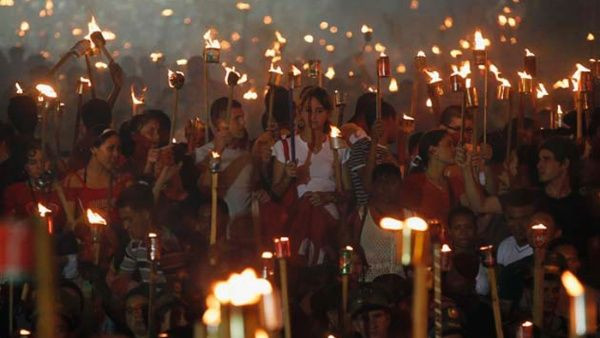CAMAGÜEY.- The torches march, to be held on January 27th, will be one of the proposals of the Young Communist League (UJC), of this territory, to honor the National Hero of Cuba, José Martí Pérez, on the eve of the celebration of the 170th anniversary of his birth.
“We will carry out the walk from the Plaza de los Trabajadores, at 6:00 pm, to the Plaza de la Libertad. It will have the assistance of the FEU, which this year celebrates its centenary, and all the youth of the municipalities. The ideas of the author of The Golden Age make it a paradigm for all the inhabitants of this nation”, the president of the UJC in the province, Kelly Álvarez Fernández, told Adelante Digital.
The official added that together with the Apostle, it is intended to pay tribute to great leaders such as Julio Antonio Mella, the Historical Leader of the Cuban Revolution, Fidel Castro Ruz and the people of Cuba. “In each of the student groups and workplaces, spaces have been created to facilitate contests, exhibitions, exchanges and visits to historical sites where the figure of Martí is discussed,” she told Adelante.
The embellishment, cleaning and care of the busts of the most universal of Cubans, the passage of the Martí flame, between the 17th and 19th of the current month, and the insertion in conversations convened by the José Martí Cultural Society, Camagüey affiliate, resulted as other actions that kept the thought of the pro-independence hero in the region latent.
Regarding the leading role of the pioneers in the reception of the 170 of the man with the white rose, the president of the province of the OPJM, Susel Quesada Mesa, said: "We have summoned infants to contests such as Making my torch and Where the palm grows , meetings with fighters, dramatizations of their children's stories, and on the 28th the Martí's Parade will take place, to which the more than 74,000 children who have this demarcation are summoned.
In addition to the birth of El Maestro, tribute will be paid to the 70th anniversary of the torchlight march, carried out for the first time in 1953 by the so-called Centennial Generation, headed by the Commander-in-Chief of the Cuban Revolution, Fidel Castro Ruz, and seven decades after the assault on the Moncada and Carlos Manuel de Céspedes barracks.
- Translated by Linet Acuña Quilez

